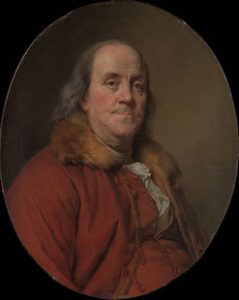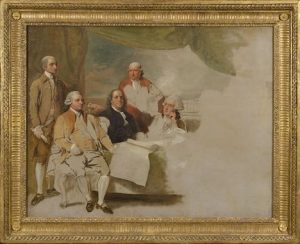‘Benjamin Franklin’ documentary by Ken Burns highlights America’s founding father
Category: Television and Streaming
Benjamin Franklin portrait by Joseph Siffred Duplessis, 1778. Credit: The Metropolitan Museum of Art, New York
Filmmaker Ken Burns brings another interesting and educational film to viewers of PBS. This time America’s founding father Benjamin Franklin is brought to the small screen and shows how this man helped create the country while dedicating his life to freedom. Actor Mandy Patinkin voices Franklin in this fascinating historical documentary.
What Burns, Patinkin, history professor Erica Armstrong Dunbar, and Franklin biographer Walter Isaacson stressed during a virtual press conference, was that Franklin sought the best blueprint for the creation of the country. His contribution to the Constitutional Convention was significant and he knew he had to compromise in order to create a free country. This meant keeping slavery alive in the south, yet he dedicated the remainder of his life to abolishing slavery.
When he emerged from the convention, he was asked by a woman in the crowd if America was to be a republic or a monarchy. He said something like, “A Republic. If you can keep it.” That is a telling statement. Franklin knew keeping a republic would take constant effort. Looking at the state of society today, he definitely knew what he was talking about.
Patinkin explained, “And to think that if Franklin hadn’t realized the necessity of compromise, … we would not have had a Constitution. So, he tried to weigh all of that and then chose to devote the rest of his life to righting his own wrong, which was first to be a slave owner and then to devote the rest of his life to be an abolitionist.” The actor continued, “Everything costs something. Franklin lost his son, who was the governor of New Jersey, I believe was the state, and the son wanted to honor the monarchy and Franklin wanted to honor democracy and the promise of America. He sacrificed that relationship with his son because he believed in this democracy.”
“Printers are educated in the belief, that when men differ in opinion, both sides ought equally to have the advantage of being heard by the publick; and that when truth and error have fair play, the former is always an overmatch for the latter,” Benjamin Franklin said about the news industry. There were no televisions back then so printers, aka newspapers, were the newscasters of the day. By highlighting this quote, Patinkin wanted to stress the fact that Franklin knew the public had to have both sides of a story to make an informed decision.
There is no doubt Benjamin Franklin was integral in the creation of the country. Were he to come back today to see what has transpired, he would probably be overwhelmed and dejected. He was a forward-thinker and put his faith in the future of America remaining a free society.
Patinkin stated, “I consider getting to be his voice for those sessions when we recorded it one of the privileges of my artistic life.”

American Commissioners of the Preliminary Peace Negotiations with Great Britain. Left to right: John Jay, John Adams, Benjamin Franklin, Henry Laurens and William Temple Franklin. Painting by Benjamin West, in the collection of Winterthur Museum, Garden & Library
About the Author
Francine Brokaw has been covering all aspects of the entertainment industry for over 25 years. She also writes about products and travel. She has been published in national and international newspapers and magazines as well as Internet websites. She has written her own book, Beyond the Red Carpet The World of Entertainment Journalists, is the entertainment correspondent for Good Day Orange County, and has her own TV show, Beyond the Red Carpet, on Village Television in Orange County. She is a longstanding member of the Television Critics Association, was a longstanding member of the Los Angeles Press Club, and is accredited by the MPAA. Follow her on Twitter.

